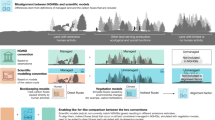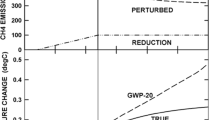Abstract
This paper discusses methodological issues relevant to the calculation of historical responsibility of countries for climate change (‘The Brazilian Proposal’). Using a simple representation of the climate system, the paper compares contributions to climate change using different indicators: current radiative forcing, current GWP-weighted emissions, radiative forcing from increased concentrations, cumulative GWP-weighted emissions, global-average surface-air temperature increase and two new indicators: weighted concentrations (analogue to GWP-weighted emissions) and integrated temperature increase. Only the last two indicators are at the same time ‘backward looking’ (take into account historical emissions), ‘backward discounting’ (early emissions weigh less, depending on the decay in the atmosphere) and ‘forward looking’ (future effects of the emissions are considered) and are comparable for all gases. Cumulative GWP-weighted emissions are simple to calculate but are not ‘backward discounting’. ‘Radiative forcing’ and ‘temperature increase’ are not ‘forward looking’. ‘Temperature increase’ discounts the emissions of the last decade due to the slow response of the climate system. It therefore gives low weight to regions that have recently significantly increased emissions. Results of the five different indicators are quite similar for large groups (but possibly not for individual countries): industrialized countries contributed around 60% to today’s climate change, developing countries around 40% (using the available data for fossil, industrial and forestry CO2, CH4 and N2O). The paper further argues including non-linearities of the climate system or using a simplified linear system is a political choice. The paper also notes that results of contributions to climate change need to be interpreted with care: Countries that developed early benefited economically, but have high historical emission, and countries developing at a later period can profit from developments in other countries and are therefore likely to have a lower contribution to climate change.
Similar content being viewed by others
References
Bernardini, O. and Galli, R.: 1993, ‘Dematerialization: Long-term trends in the intensity of use of materials and energy’, Future 25, 431–447.
Den Elzen, M. G. J., Berk, M., Schaeffer, M., Olivier, J., Hendriks, C. and Metz, B.: 1999, ‘The Brazilian proposal and other options for international burden sharing: An evaluation of methodological and policy aspects using the FAIR model’, RIVM Report No. 728001011.
Den Elzen, M. G. J. and Schaeffer, M.: 2002, ‘Responsibility for past and future global warming: Uncertainties in attributing anthropogenic climate change’ Climatic Change 54, 29–73.
Den Elzen, M. G. J., Schaeffer, M. and Eickhout, B.: 2002, ‘Responsibility for past and future global watrming: Time horizon and non-linearities in the climate system’, RIVM Report 728001022, Dutch National Insitute fo Public Health and the Environment, Bilthoven, The Netherlands.
EDGAR-HYDE 1.4, Emission Database for Global Atmospheric Research, History Database of the Global Environment, RIVM, Van Aardenne et al. (2001) adjusted to Olivier and Berdowki (2001) from http://www.rivm.nl/env/int/coredata/edgar/ in June 2002.
Enting, I. G.: 1998, ‘Attribution of greenhouse gas emissions, concentrations and radiative forcing’, CSIRO Atmospheric Research Technical Paper No. 38, CSIRO, Aspendale Victoria, Australia.
Enting, I. G. and Law, R. M.: 2002, ‘Characterising historical responsibility for the greenhouse effect’, CSIRO Atmospheric Research Technical Paper No. 41, CSIRO, Aspendale Victoria, Australia.
Enting, I. G. and Trudinger, C. M.: 2002, ‘Comaring formalisms for attributing non-linear effects’, contribution to the 2002 SBSTA assessment of the Brazilian Proposal, CSIRO, Australia, available at http://unfccc.int/program/mis/brazil/index.html.
Grossman, G. and Krueger, A.: 1995, ‘Economic growth and the environment’, Quart. J. Econ. 110(2), 353–377.
Grubb, M. J., Hope, C. and Fourquet, R.: 2002, ‘Climatic implications of the Kyoto Protocol: The contribution of international spillover’, Climatic Change 54, 11–28.
Höhne, N. and Harnisch, J.: 2002, ‘Evaluating indicators for the relative responsibility for climate Change—Alternatives to the Brazilian Proposal and Global Warming Potentials’ in Van Ham, Baede, Guicherit, and Williams-Jacobse (eds.), Non-CO2 Greenhouse Gases, Milpress, Rotterdam, pp 371–376, ISBN 90-77017-70-4.
Houghton, R. A.: 1999, ‘The annual net flux of carbon to the atmosphere from changes in land use 1850–1990’, Tellus 51B, 298–313.
IPCC: 1990, Climate Change, the IPCC Scientific Assessment, Cambridge University Press, Cambridge.
IPCC: 1995, Climate Change 1995, Cambridge University Press, Cambridge.
IPCC: 2000, Special Report on Emissions Scenarios, Intergovernmental Panel on Climate Change, Cambridge University Press, Cambridge.
Ramaswamy, V., Boucher, O., Haigh, J., Hauglustaine, D., Haywood, J., Myhre, G., Nakajima, T., Shi, G. Y., and Solomon, S.: 2001, ‘Radiative Forcing of Climate Change’, in Houghton, J. T., Ding, Y., Griggs D. J., Noguer, M., van der Linden, P. J., Dai, X., Maskell, K., and Johnson, C. A. (eds.), Climate Change 2001, the Scientific Basis, Cambridge University Press, Cambridge, pp. 349–416.
Kuznets, S.: 1955, ‘Economic growth and income inequality’, Am. Econ. Rev. 45(1), 1–28.
Marland, G., Boden, T. and Andres, B.: 2001, ‘Fossil and Cement CO2 Regional CO2 Emissions from Fossil-Fuel Burning, Cement Manufacture, and Gas Flaring: 1751–1998’, Carbon Dioxide Information Analysis Center, Oak Ridge National Laboratory, University of North Dakota, Grand Forks, July 31, 2001, from http://cdiac.esd.ornl.gov/trends/trends.htm
Meira Filho, L. G., and Gonzales Miguez, J. D.: 2000, ‘Note on the time-dependant relationship between emissions of greenhouse gases and climate change’, Technical note, Ministry of Science and Technology, Federal Republic of Brazil, available at http://www.mct.gov.br/clima
Olivier, J. G. J. and Berdowski, J. J. M.: 2001, ‘Global emissions sources and sinks’, in Berdowski, J., Guicherit, R. and Heij, B. J. (eds.), The Climate System, A. A. Balkema Publishers (Swets & Zeitlinger Publishers, Lisse, The Netherlands, pp. 33–78, ISBN 90-5809-255-0.
UNFCCC: 1992, ‘United nations framework convention on climate change’, available at www.unfccc.int
UNFCCC: 1997, ‘Implementation of the Berlin Mandate, additional proposal by Parties’, Document FCCC/AGBM/1997/MISC.1/Add.3 available at http://www.unfccc.int
UNFCCC: 2001, ‘Progress report on the review of the scientific and methodological aspects of the proposal by Brazil’, Document FCCC/SBSTA/2001/INF.2 available at http://www.unfccc.int
UNFCCC 2002, ‘Scientific and methodological aspects of the proposal by Brazil. Report of the expert meeting’, Document FCCC/SBSTA/2002/INF.14 available at http://www.unfccc.int
Van Aardenne, J. A., Dentener, F. J., Olivier, J. G. J., Klein Goldewijk, C. G. M., and Lelieveld, J.: 2001, ‘A 1 (1 degree resolution dataset of historical anthropogenic trace gas emissions for the period 1890–1990’, Global Biogeochem. Cycles, 15(4), 909–928.
Author information
Authors and Affiliations
Corresponding author
Rights and permissions
About this article
Cite this article
Höhne, N., Blok, K. Calculating Historical Contributions To Climate Change – Discussing The ‘Brazilian Proposal’. Climatic Change 71, 141–173 (2005). https://doi.org/10.1007/s10584-005-5929-9
Received:
Revised:
Issue Date:
DOI: https://doi.org/10.1007/s10584-005-5929-9




